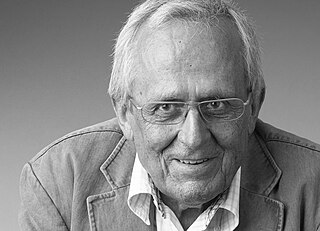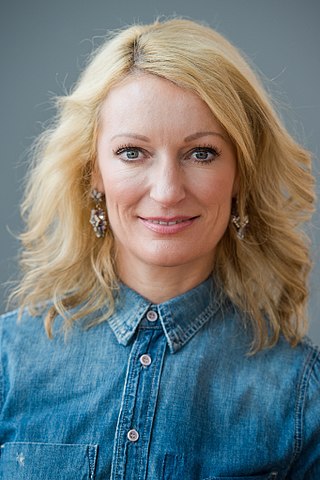Related Research Articles

Dieter Herbert Nuhr is a German kabarett artist, comedian, author and television presenter.

Bayerischer Rundfunk, shortened to BR, is a public-service radio and television broadcaster, based in Munich, capital city of the Free State of Bavaria in Germany. BR is a member organization of the ARD consortium of public broadcasters in Germany.

Dieter Hildebrandt was a German Kabarett artist.

Josef Hader is an Austrian stand-up comedian, actor and filmmaker.

Hagen Rether is a Romanian-born German political cabaret artist and musician. The most remarkable features in his performance are usually the presence and use of a grand piano. He was a frequent contributor to the German Kabarett TV show Scheibenwischer.

Georg Schramm is a German Kabarett artist. He was a host of the Kabarett shows Scheibenwischer and Neues aus der Anstalt.
Scheibenwischer was the name of a long-running German Kabarett show. It was founded in 1980 by Dieter Hildebrandt and produced by BR / RBB to be broadcast on Das Erste. The show ended in 2008 after 28 years on the air.

Neues aus der Anstalt is a political cabaret program on German television station ZDF, hosted by Urban Priol and Frank-Markus Barwasser, who replaced Georg Schramm. Broadcast monthly from 2007 to 2013, it usually featured three guest cabaret artists in addition to the hosts.

Urban Priol is a German Kabarett artist and comedian.

Richard Rogler was a German Kabarett artist and professor of Kabarett at the University of the Arts in Berlin.

Andreas Rebers is a Kabarett artist, author and musician from Munich. His shows often incorporate performances on the accordion or the piano.
Kabarett is satirical revue, a form of cabaret which was developed in France by Rodolphe Salis in 1881 as the cabaret artistique. It was named Le Chat Noir and was centered on political events and satire. It later inspired creation of Kabarett venues in Germany from 1901, with the creation of Berlin's Überbrettl venue and in Austria with the creation of the Jung-Wiener Theater zum lieben Augustin housed in the Theater an der Wien. By the Weimar era in the mid-1920s it was characterized by political satire and gallows humor. It shared the characteristic atmosphere of intimacy with the French cabaret from which it was imported, but the gallows humor was a distinct German aspect.

Frank-Markus Barwasser is a German political satirist and journalist. On stage, he almost always acts as the character of Erwin Pelzig, wearing a corduroy hat.

The heute-show is a German late-night satirical television program airing every Friday evening on public broadcasting channel ZDF. A conceptual adaptation of The Daily Show with Jon Stewart, it is presented by German comedian and journalist Oliver Welke. Heute show presents the weekly news with funny or sarcastic and cynical comments, especially focusing on issues that are subject of the latest political discussions in Germany. Welke argues that he might help to make people interested in politics and might help to point out "what goes the wrong way" in parliamentary debates, in ministries, in institutions, and in parties. Sometimes, he simply mocks "people who deserve it" in his show.

Claus von Wagner is a German Kabarett artist, a stand-up observational comic and political satirist.

Monika Gruber is a German cabaret artist and actress.

Hans-Joachim Heist is a German actor and comedian.

Werner Schneyder was an Austrian kabarett performer, journalist, writer, actor, stage director, television presenter and sports reporter. He performed political kabarett with Dieter Hildebrandt from 1974 to 1982, with an extra program presented in Leipzig, then in the GDR, in 1985. He moderated das aktuelle sportstudio on ZDF from 1975, and a series about boxing for RTL from 1992 to 1999. He described himself as a Universaldilettant.

Nico Semsrott is a German Kabarett artist, slam poet, and politician. He was elected as a Member of the European Parliament in 2019 as a member of Die PARTEI, but left the party in 2021, and sat as an independent.

Allison Hazel Brugger is a Swiss-American slam poet, comedian, cabaret artist, and television presenter.
References
Footnotes
- ↑ Reinhard 2006, pp. 90, 94.
- 1 2 "Kabarett Neues aus der Anstalt im ZDF gestartet". Mittelbayerische Zeitung (in German). 24 January 2007. Retrieved 17 August 2009.[ dead link ]
- ↑ Reinhard 2006, p. 90.
- 1 2 3 Behrmann 2002 , p. 168
- 1 2 Casadevall 2007 , p. 81
- 1 2 3 Siegordner 2007 , p. 32
- ↑ Siegordner 2007, pp. 31, 32.
- ↑ Kühn 1993, p. 179.
- ↑ Behrmann 2002, pp. 168, 169.
- ↑ Reinhard 2006, pp. 92, 93.
- ↑ Hübner 1995, p. 150.
- ↑ Reinhard 2006, pp. 93.
- ↑ Reinhard 2006, p. 94.
- 1 2 Reinhard 2006 , p. 95
- ↑ Behrmann 2002, p. 169.
- ↑ Casadevall 2007, p. 82.
Sources
- Behrmann, Sven (December 2002). Politische Satire im deutschen und französischen Rundfunk (in German). Königshausen & Neumann. ISBN 3-8260-2346-3.
- Casadevall, Gemma (January–April 2007). "Political satire in Germany: from the political Kabarett of the thirties to Comedy TV" (PDF). Quaderns del CAC (27). ISSN 1138-9761.
- Hübner, Klaus (1995). "Die satirische Mattscheibe". Die Horen 177 (in German). 1.
- Kühn, Volker [in German] (1 January 1993). Die Zehnte Muse (in German). ISBN 3-8025-2244-3.
- Reinhard, Elke (21 January 2006). Warum heißt Kabarett heute Comedy? (in German). ISBN 3-8258-9231-X.
- Siegordner, Martin (November 2007). Politisches Kabarett – Definition, Geschichte und Stellung (in German). Grin Verlag. ISBN 978-3-638-72669-6.